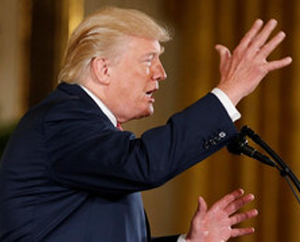Washington, Jun 6: US President Donald Trump said on Tuesday his trip to the Middle East was "already paying off" as regional leaders followed through on their promise to take a hard line on funding militant groups.
"So good to see the Saudi Arabia visit with the King and 50 countries already paying off. They said they would take a hard line on funding extremism, and all reference was pointing to Qatar. Perhaps this will be the beginning of the end to the horror of terrorism!" Trump said in a series of Twitter posts.
Trump said the leaders he met on a Middle East trip had warned him that Qatar was funding "radical ideology" after he had demanded they take action to stop financing militant groups.
The comments on Twitter - Trump's first about the rift between Qatar and major Arab nations over alleged support of Iran and Islamist groups - came as the leader of Kuwait was to meet in Saudi Arabia to try to mediate the dispute.
Qatar vehemently denies the accusations against it, calling them baseless. Ordinary Qataris, however, were to be found crowding into supermarkets to stock up on goods against the crisis.
Saudi Arabia, Egypt, the United Arab Emirates and Bahrain severed relations with Qatar and closed their airspace to commercial flights on Monday, in the worst split between powerful Arab states in decades.
"During my recent trip to the Middle East I stated that there can no longer be funding of Radical Ideology. Leaders pointed to Qatar - look!" Trump tweeted.
The comments lent credence to a view held by some analysts that Trump in his Middle East trip emboldened the Arab nations to take action even though Qatar is a US ally and hosts a US military base.
Gulf Arab officials said Kuwait's Emir Sheikh Sabah Al-Ahmad Al-Jaber al-Sabah will meet with Saudi Arabia's King Salman later in the day, hoping to heal the damaging rift which has affected global oil prices, hit travel plans and sown confusion among bankers and businesses in the region.
The split among the Sunni states erupted last month after Trump attended a summit of Muslim leaders in Saudi Arabia where he denounced Shi'ite Iran's "destablising interventions" in Arab lands, where Tehran is locked in a tussle with Riyadh for influence.
In a sign of the potential consequences for the Qatari economy, a number of banks in the region began stepping back from business dealings with Qatar. Saudi Arabia's central bank advised banks in the kingdom not to trade with Qatari banks in Qatari riyals, sources said.
Oil prices also fell on concern that the rift would undermine efforts by OPEC to tighten production.
Qatar and the other Arab states fell out over Doha's alleged support for Islamist militants and Shi'ite Iran.
Foreign Minister Sheikh Mohammed bin Abdulrahman al-Thani told Qatar-based Al Jazeera TV that Qatar will not retaliate, hoping Kuwait will help resolve the dispute. It wants to give Kuwait's ruler the ability to "proceed and communicate with the parties to the crisis and to try to contain the issue".
Qatar's leader, Sheikh Tamim bin Hamad Al-Thani, spoke by telephone overnight with his counterpart in Kuwait and, in order to allow Kuwait to mediate, decided to put off a planned speech to the nation, the foreign minister said.
Qatar has for years parlayed its enormous gas wealth and media influence into a broad influence in the region. But Gulf Arab neighbours and Egypt have long been irked by its maverick stances and support for the Muslim Brotherhood, which they regard as a political enemy.
Yemen, Libya's eastern-based government and the Maldives - close allies of Qatar's adversaries in the spat - also cut ties.
Banks shun Qatar, flights diverted
Tightening pressure, Saudi Arabia's aviation authority revoked the license of Qatar Airways and ordered its offices to be closed within 48 hours, a day after the kingdom, the UAE and Bahrain closed their airspace to Qatari commercial flights.
Flight tracker websites showed Qatar Airways flights taking a circuitous route mostly over Iran to avoid their neighbours.
Some Saudi Arabian and UAE commercial banks were also shunning Qatari banks, holding off on letters of credit, banking sources told Reuters on Tuesday.
With an estimated $335 billion of assets in its sovereign wealth fund and its gas exports earning billions of dollars every month, Qatar, however, has enough financial power to protect its banks.
Qatar's stock market rebounded in early trade on Tuesday after plunging the previous day but the Qatari riyal fell against the US dollar.
Kuwait's emir, who has spent decades as a diplomat and mediator in regional disputes, hosted Sheikh Tamim last week as the crisis began brewing.
Monday's decision forbids Saudi, UAE and Bahraini citizens from travelling to Qatar, residing in it or passing through it, instructing their citizens to leave Qatar within 14 days and Qatari nationals were given 14 days to leave those countries.
The measures are more severe than during a previous eight-month rift in 2014, when Saudi Arabia, Bahrain and the UAE withdrew their ambassadors from Doha, again alleging Qatari support for militant groups.







Comments
Add new comment